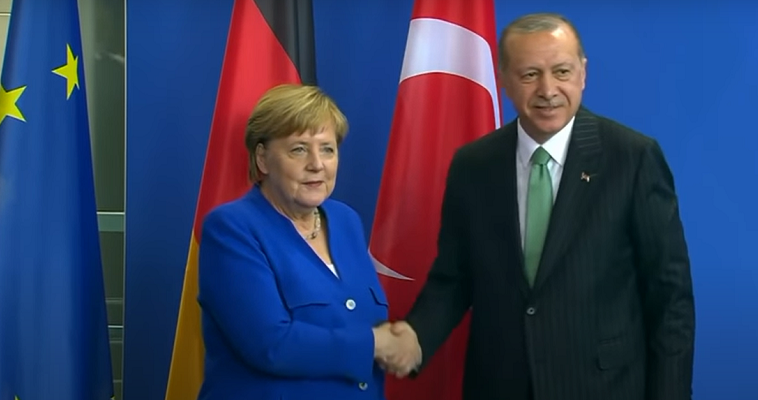Dimitris Stathakopoulos: Greece is also responsible that the West does not stand by it
21/06/2020
Under international law and according to dictionaries, an “alliance” is defined as an agreement between two or more states on joint military, defensive, or offensive military action against a third state outside the alliance that may attempt to offend, disrupt, through a military confrontation or a hostile act in general, against one of the allied states.
An alliance is not informal, but takes on the semblance of a formal legal contract, governed by rules, rights, and obligations. An important distinction between alliances is obvious and secret. They are denounced before their expiration, or even extended, while historically, members of alliances have always had relations (overt, or covert, commercial, etc.) with third countries that did not participate in the alliance.
The words of British Foreign Secretary and later Prime Minister Lord Palmerston “nations do not have stable friends or enemies, they only have stable interests”, are the quintessence for understanding alliances. In hindsight, we see that in the 1970s, under the presidency of Nixon, US multinationals found that “although China is communist, the prospects were wonderfully opened with another (then) 700,000,000 people in the market.”
Earlier, in the 16th century (1515-1547), King Francis I of France, despite the anti-Muslim and anti-Ottoman attitude of the Europeans, thought that “although the Ottomans are infidels, the vast market of the Ottoman Empire is very profitable”. Thus, as early as 1536, with the economic-tax facilitation of concessions/capitulations (Kapitülasyon-capitulation of Suleiman the Magnificent), instead of war, the West and the Ottomans began trading.
In fact, the French, British, Venetians, Austrians, etc., made early “Free Economic Zones” (FEZs) in the Ottoman Empire, without the Ottomans doing the same in Europe, a fact that the great Turkish historian Halil Inalcik considers the beginning of the Ottoman decline. where they saw only the profit-benefit (the “cheese”, but not the trap). These concessions (Kapitülasyon), were the occasion usd by Greeks to strengthen their mercantile prospects, to acquire property and ultimately to help the awakening of the nation, after taking advantage of “foreign flags”.
The allies in the West and Greece
According to the UN Charter, the current Alliances have only a defensive character, such as NATO, the Southeast Asia Treaty Organization (SEATO), of course the EU’s economic union (but not military) and others. That is why the term alliance is alternatively referred to as “Coalition” (informal and undetermined enemy) related to geopolitics, politics, trade, economy, society and in general any human international action (so many sciences are now involved in understanding and analyzing and rendering such concepts).
Despite their divisive nature, the Greeks have long considered the Europeans as their allies, even if they had been attacked and subjugated, respectively by their enemies from the east (starting with the Persians, the Arabs and the Ottomans). Respectively, as mentioned above, the Romans, the Vandals, the Celts, the Franks (1204), who did not actually help in 1453 (except for Giovanni Giustiniani and solitary individuals), had acted with displeasure, while the Holy Alliance was against the revolution of 1821.
In addition, the West had parallel relations with Greeks and Ottomans during the period of the struggle of 1821, throughout the 19th century, during the First World War (the Germans), during the Second World War (the Nazis on an official basis and unofficially the British and Americans who considered the Turkish allies allowing them at the end a place of the winners’ table, in May 1945), and this continues to this day.
Today, with Turkey a part of NATO, it has excellent bilateral relations with all EU countries, as well as the United States, the Arab world, Japan, China (as well as love/hate relationship with Russia, Iran, and the United Arab Emirates, as well as, even, Egypt), to the point that the international literature considers it to be “evasive neutral”, being the title of the book of the same name by Frank Weber .
The “prodigal” ally Turkey
So what differentiates Greece from Turkey in the eyes of our common allies? What are the quality characteristics that will make our western allies choose Greece over Turkey? Is it their romantic philhellenism? I very much doubt it, since it is not a universal phenomenon but an individual one (let’s not forget the work Contra errores Graecoroum (Contra errores Graecorum, ad Urbanum IV Pontificem Maximum (Against the Errors of the Greeks, to Pope Urban IV) is a short treatise (an “opusculum”) written in 1263 by Roman Catholic theologian Saint Thomas Aquinas ) and other historical events. Is it because Turkey is a Muslim country with Erdogan as its president? I also doubt it!
Did the fact that it is an unreliable country in its alliances, as an evasive neutral, being everywhere and nowhere? This has not discouraged them at all. On the contrary, everyone is claiming Turkey is an ally, doing business there, selling weapons, forcing them to do “the dirty work” where required. They are reminiscent of the parable of the prodigal son, where the father sacrificed the fatted calf for the prodigal son (say Turkey) and not for the “faithful son”, who is a given and is predictable (say Greece)!
Will they prefer Greece because it is fighting on their behalf? But we are not doing it in the correct manner. Is it because we are a large country in terms of area, population and consumption of their products? But we are not! After all, they see us as a common area of the Eastern Mediterranean, together with Turkey, while they do not like at all that we call on them to solve our problems (financial, refugee flows, immigration, geopolitical and sovereignty issues).
Should Greece become Israel!
We look so weak in their eyes, but mainly in the eyes of the Turks. Everyone is getting misleading messages from Greece, which has a deeply divided society with enormous envy among citizens, where in order to erroneously maintain its peace of mind, it agrees to the use of a Greek historical name by a neighboring country.
Although the third parties seemingly said a loud “yes”, they essentially understood that the country is weak in supporting its rights and possibly if pressured further, it may again “buckle under” in the future on another issue. In conclusion, Greece gives the wrong impression to third parties, and especially to its allies (even to Turkey as its ally, because of NATO), that we cannot stand on our own two feet financially, economically, united as a people, in terms of sovereignly, militarily. That has to change from what it has been until now.
Although I am accused of many things (from irrelevant, Turkish-baiter, to Turkish-lover, from Islamophile, to Islamophobic and finally even of being a Zionist), I believe that the Greek model should be of self-confidence promoted by the motto urbi et orbi and essentially meaning resembling Israel (by promoting self-sustainability and promoting its gravitas abroad, signifying that whoever dares touch it “will be the worse for it”), with the help of its lobby and its international public relations.
We are definitely referring to a model that will of course be adapted to Greek idiosyncrasy, lest the climate be reversed (so that our common allies with the Turkey something which is not clear at this time!





